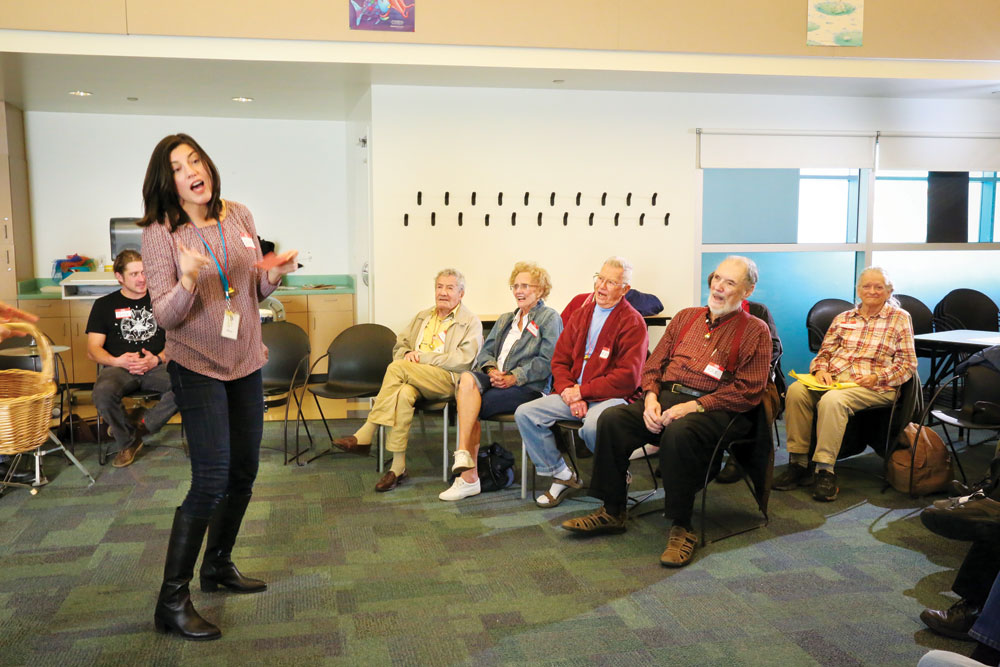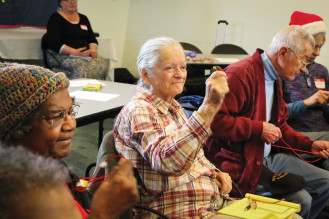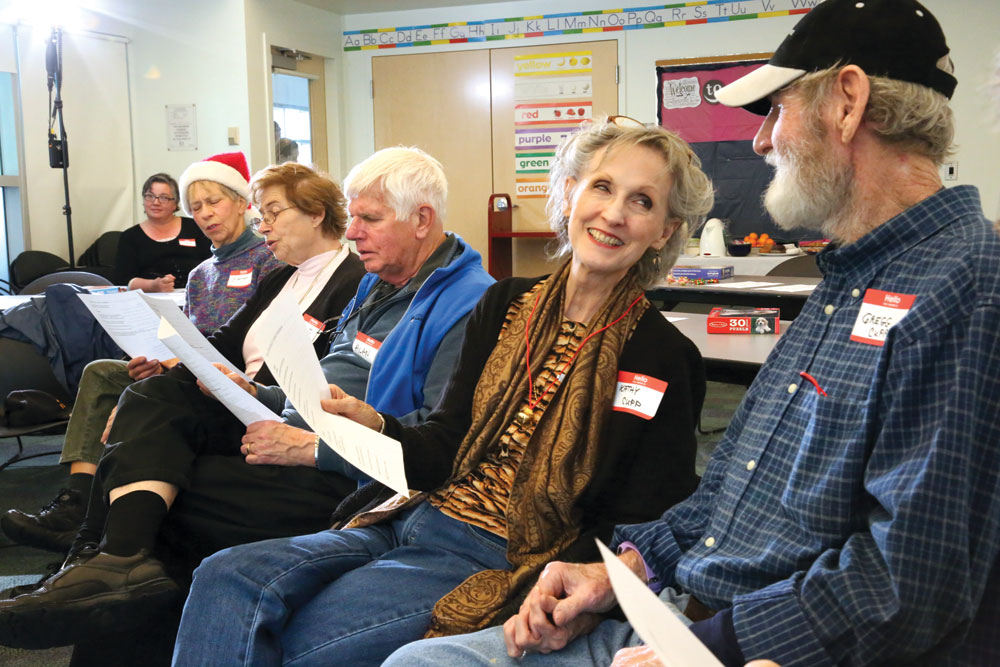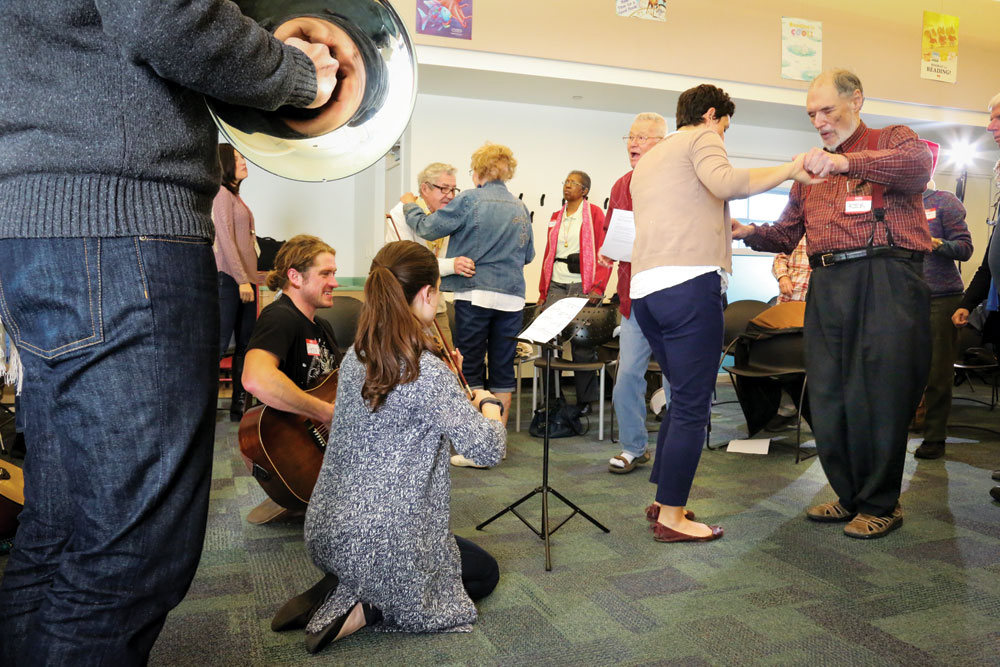
Reference Librarian, Amy DelPo takes a turn leading the group in songs. DelPo was inspired to start the Memory Cafe at the library by her own mother, who has Alzheimer’s Disease.

Dorothy McNeese and her fellow cafe-goers make music with bells and other instruments.
During a time of year when many people are making New Year’s resolutions about getting fit or saving money, the more pressing issue for some is figuring out how to cope with loved ones with memory loss issues. Whether it’s just a little forgetfulness or an actual diagnosis, finding a sense of community and fun can be the goal in the face of an isolating situation.
Ed Whitney walks into the community room with Kathy, his wife of almost 35 years, beaming and raring to go. He writes “E-Z Ed” on his name tag, a nickname that harkens back to his time in the military. Both are clearly happy to have arrived at the Memory Café in the Lowry neighborhood’s Schlessman Family Branch Library. It’s a social outlet for the couple and a chance to help Ed with memory skills in fun and creative ways.
Kathy describes Ed’s Alzheimer’s as being in the early stage, “but heading into mid-stage at this point—things are changing.” During the Memory Café, which started in October and meets the second and fourth Tuesdays of the month for 90 minutes, visitors take in musical entertainment, even singing along and playing simple instruments. They learn new skills, work puzzles and talk and laugh over coffee and doughnuts. Those happy times are also therapeutic for everyone in attendance.
Being able to strategize with other people about how to remain positive in the face of the challenges they live with is helpful. “The disease is not only isolating for the person with memory loss but it can be somewhat isolating for the person who is a caregiver,” says Kathy. She tries to spend time with her friends, “But there’s a point where, if friends don’t have a sense of what it means to have the disease or be living with someone (who does), they don’t have as much understanding. Although they are very caring, you don’t want to wear out your welcome when you’re talking to people.”
The Schlessman Memory Café was started in October by Reference Librarian Amy DelPo whose mother has Alzheimer’s disease. When her mother was in the middle stage, DelPo looked around Denver and couldn’t find much for her mother to do and says, “She was very lonely, isolated and withdrawn.” DelPo looked to the library, figuring there would be things she could take her mother to, but there weren’t. Then she looked online and learned about the Memory Café concept, started in Europe, with many throughout the U.S. There are currently eight Memory Cafés in Colorado, a program of the Alzheimer’s Association. But DelPo’s program is thought to be the only one in the state located in a library. Because most neighborhoods have a library that is accessible and familiar to residents, she hopes that the Memory Café concept will grow to many other libraries in Colorado.

Kathy and Gregg Cupp share a moment. Time at the Memory Cafe helps caretakers and those with memory loss enjoy time together and a break from the focus on their medical situations.

As comfort levels rise among the group, singing and playing music give rise to dancing. Rick Leete is shown dancing with instructor Kera Magarill.
The Memory Café models DelPo had seen elsewhere were either only free-form social time or a very structured program. She combined the two with the more structured program at the start to help break the ice, such as singing, learning about meditation, a cooking class or art—and then more social time in the second part to allow for conversation. A grant from the Denver Public Library covers food, games and sometimes the guest presenter.
When Kera Magarill leads the group in singing and making music, that’s just part of her job as early stage service coordinator with the Alzheimer’s Association of Colorado where she provides social engagement programs. Her program also provides information and classes in future planning, including legal and financial issues for people recently diagnosed and their care persons. Magarill says the Memory Cafés help normalize life for the attendees and help them battle the tendency toward becoming isolated.
DelPo’s formerly social mother hesitated to go places out of fear of embarrassing herself by not remembering names or being unable to follow directions. “She immediately isolated herself and it was so sad,” says DelPo. “That’s what I love about this group—you can come and not remember people’s names and you don’t need to be embarrassed because it’s understood that everyone here deals with memory so it’s just fine.” There is no criteria for who can come to the Memory Café. Anyone with any level of memory loss and every age is welcome.
Although the Memory Café is not a medical or educational program, the activities are mentally, physically and emotionally stimulating. That break from having life revolve around medical issues is beneficial. “I have people say to me, ‘It’s such a relief to come to something that isn’t medical’ because so much of what’s out there for this community is health care-based or social services-based, whereas this is just about ‘let’s have a good time,’” she says. “There’s still a lot of life to live and a lot of quality of life to enjoy and it’s kind of a relief to not have to be put in that box when you come here.”
For more information regarding the Schlessman Memory Café, contact Amy DelPo at Schlessman Memory Café at 720.865.0000.




0 Comments